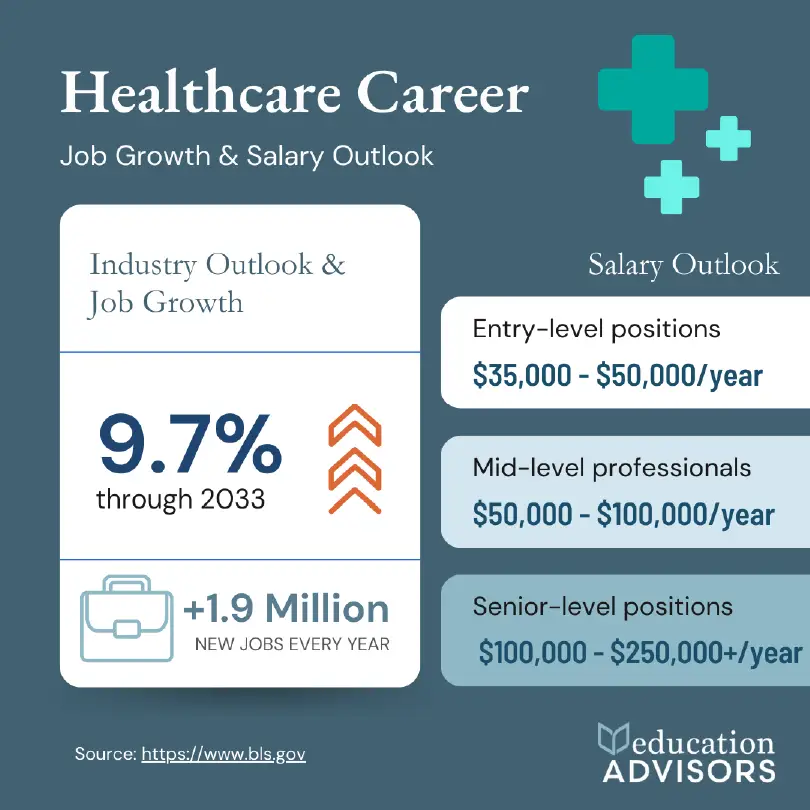
AI Boom: Industries on the Rise vs. Industries in Decline
College Planning AI Boom: Industries on the Rise vs. Industries in Decline Find Your Program
Discover your future
The healthcare field offers a wide range of career opportunities, from patient-facing roles to essential administrative and management positions. Whether you’re passionate about organizing medical records, managing healthcare facilities, or streamlining billing processes, there’s a healthcare degree program for you. Careers in non-clinical areas like Medical Billing & Coding, Healthcare Management, and Healthcare Accounting are in high demand, providing stability, growth, and the chance to make a meaningful impact without direct patient care. This guide explores the various healthcare degree programs, career paths, salary potential, and industry trends to help you find the right fit for your future.

College Planning AI Boom: Industries on the Rise vs. Industries in Decline Find Your Program


CAREER CONNECTIONS From CNA to RN: Here’s the Fastest Path (With Online Options!) Find Your


CAREER CONNECTIONS 5 Healthcare Roles AI Will Never Replace Find Your Program Table of Contents
Healthcare degree programs offer diverse opportunities, ranging from clinical support roles to administrative and management positions. Whether you’re starting with a certificate or aiming for an advanced degree, there’s a program to fit your career goals.
Ideal for: Entry-level roles such as Medical Billing & Coding Specialist or Pharmacy Technician.
Duration: 18 months.*
Focus Areas:
Ideal for: Careers like Medical Administrative Assistant, Medical Assistant, or Health Information Technician.
Duration: Typically 2 years.
Focus Areas:
Ideal for: Roles such as Healthcare Manager, Healthcare Accountant, or Human Services Specialist.
Duration: Typically 4 years.
Focus Areas:
Ideal for: Advanced roles such as Health Services Administrator or Executive Director in healthcare settings.
Duration: 1-2 years post-bachelor’s.
Focus Areas:
*completion times vary by institution/program
Healthcare careers span a wide range of roles, many of which do not involve direct patient care. Below are popular career paths, typical responsibilities, and degree requirements:


Role: Ensure accurate coding of medical procedures and processing of insurance claims.
Degree Required: Certificate or associate degree in Medical Billing & Coding.


Role: Assist pharmacists with dispensing medications and managing inventory.
Degree Required: Certificate or associate degree in Pharmacy Technology.
Median Salary: $40,300/year


Role: Lead healthcare teams, manage budgets, and implement policies within healthcare organizations.
Degree Required: Bachelor’s or master’s degree in Healthcare Management.
Median Salary: $110,680/year.


Role: Provide direct patient care, administer medications, and educate patients about their health.
Degree Required: Associate or Bachelor’s Degree in Nursing (ADN/BSN).
Median Salary: $86,070/year


Role: Provide advanced patient care, including diagnosing and prescribing treatment.
Degree Required: Master’s Degree in Nursing (MSN) or Doctor of Nursing Practice (DNP).
Median Salary: $129,480/year


Role: Diagnose and treat illnesses, prescribe medications, and perform medical procedures.
Degree Required: Doctor of Medicine (MD) or Doctor of Osteopathic Medicine (DO).
Median Salary: $239,200/year
The healthcare sector is one of the fastest-growing industries, driven by advancements in technology, an aging population, and the need for efficient healthcare systems. According to the Bureau of Labor Statistics:
Healthcare salaries vary widely based on the role, education level, and experience:
Professionals in states like California, Texas, and New York often earn higher-than-average salaries due to strong demand in these regions.


A career in healthcare offers stability, growth, and the chance to make a meaningful impact. Whether your passion lies in clinical care as a nurse or physician or in non-clinical roles like Medical Billing & Coding or Healthcare Management, there’s a degree program to help you achieve your goals. With a growing demand for healthcare professionals across all sectors, now is the perfect time to take the next step in your journey.
Absolutely! Many roles, such as Medical Billing & Coding Specialist, Healthcare Accountant, and Healthcare Manager, are non-clinical and focus on administrative or operational tasks.
The time to complete a healthcare degree depends on the type of degree:
Absolutely! Clinical and non-clinical healthcare roles are growing rapidly due to advancements in technology and increased demand for services.
Many accredited institutions offer online healthcare programs, particularly for non-clinical fields like Medical Billing & Coding or Healthcare Management.
Yes, many accredited institutions offer online healthcare programs that provide the same quality education as on-campus options.
Healthcare Managers, Healthcare Accountants, and Health Information Managers are some of the highest-paying non-clinical roles.
While not always required, certifications like CPC (Certified Professional Coder) or CCS (Certified Coding Specialist) can enhance job prospects.
*Salary figures, job growth statistics, and career outcomes are based on national averages and may vary based on location, experience, and employer requirements. This information is for general guidance only.